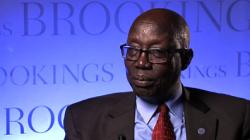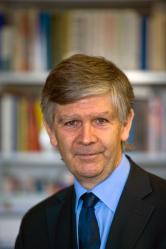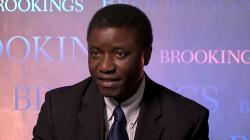

12:00 am EST - 12:00 am EST
Past Event
This event, sponsored by the Brookings-LSE Project on Internal Displacement, was held concurrently with the
sixteenth regular session of the United Nations Human Rights Council
in Geneva, Switzerland.
The three UN experts who served on the mandate on the human rights of internally displaced persons came together at an event organized in Geneva during the UN Human Rights Council. The three mandate-holders reflected on the achievements and challenges of their mandates: Francis Deng (1992-2004), Walter Kälin (2004-10) and Chaloka Beyani (November 2010-present) reflected on the achievements and challenges of working to protect the human rights of IDPs over the course of the past twenty years. The event was chaired by Christian Strohal, Ambassador and Permanent Representative of Austria.
Navanethem Pillay, UN High Commissioner for Human Rights, opened the event, noting that this mandate has been particularly active and effective both in contributing to the international normative framework and in working with states, key UN organizations and other stakeholders to promote the rights of internally displaced persons (IDPs). She noted that the Guiding Principles on Internally Displaced Persons have become an important international framework and that they are an excellent example of the way a mandate-holder has contributed to the development of international human rights law. The Guiding Principles have also paved the way for a ground-breaking new regional treaty, the Convention on the Protection and Assistance of Internally Displaced Persons in Africa. The three mandate-holders have visited over 30 countries since 1992 to respond to often urgent and complex situations of internal displacement. Moreover, they have supported workshops and training programs to build the capacities of actors on the ground. She closed her remarks by expressing her appreciation for the many years of dedicated work by Francis Deng and Walter Kälin and expressed her best wishes to Chaloka Beyani for a successful and rewarding first term as Special Rapporteur on this challenging mandate.
Francis Deng recalled that when the mandate was established in 1992, it was such a sensitive issue that the position was created for only a one year period (It was subsequently renewed for two years before being renewed for the normal three year term). The issue was sensitive because internal displacement was considered an internal issue and there were fears that the mandate would be used as a tool to infringe on the sovereignty of the state. Mr. Deng remarked that his approach was to work with governments to support them rather than antagonizing them. The best way to protect national sovereignty, he reflected, is to exercise it responsibly; governments often realized that it is in their interests to uphold the rights of those displaced within their borders. He was asked by the then-UN Commission on Human Rights to develop an appropriate framework for responding to internal displacement and brought together legal experts to develop what were to become the Guiding Principles. Rather than creating a new set of obligations, the Guiding Principles restated existing international humanitarian law, international human rights law and, by analogy, refugee law. The Guiding Principles were first adopted by the Inter-Agency Standing Committee and were then presented to the Human Rights Commission which took note of them. Rather than pressing for them to be adopted by the Commission, Mr. Deng began using them as a tool to support states in the adoption of national policies protecting the rights of IDPs. Finally, he noted that his present position, as Representative of the Secretary-General on the Prevention of Genocide, is based on three pillars: state responsibility, support for state efforts and assertive involvement of the international community.
In beginning his tenure as Representative of the Secretary-General on the Human Rights of IDPs, Walter Kälin decided to focus his work on four areas: building the normative framework for internal displacement; strengthening through dialogue the political will of states to implement the framework; and building the capacity of relevant actors to uphold the Guiding Principles and address new challenges, such as internal displacement caused by natural disasters. In 2005, the Guiding Principles were recognized as an important framework for addressing the protection of IDPs by the world’s heads of states during the meeting of the World Summit. At the regional level, the Guiding Principles served as the basis for the development first of the International Conference of the Great Lakes Region’s Protocol on the Protection and Assistance to Internally Displaced Persons and later of the African Union Convention for the Protection and Assistance of Internally Displaced Persons in Africa (Kampala Convention) as well as other regional initiatives. The mandate had worked with governments to support the development of laws and policies on IDPs and with international actors to mainstream the issues of IDPs into their work. Walter Kälin also overlw the development of a number of tools to support efforts on behalf of the internally displaced both by governments and other actors such as a handbook on laws and policies, the Operational Guidelines on the Protection of Persons in Situations of Natural Disasters, the Inter-Agency Framework on Durable Solutions for Internally Displaced Persons, and the resource, Integrating Internal Displacement in Peace Processes and Peace Agreements: A Guide for Mediators.
Chaloka Beyani began his remarks by paying tribute to his predecessors for their impressive engagement and success in working with IDPs. He recalled that his own involvement with displacement began with the development of the Great Lakes Protocol and later with work on the text of the AU Convention — both of which incorporated the Guiding Principles. He noted that six governments have thus far ratified the AU convention; 15 ratifications are needed for the treaty to enter into force. He intends to continue in the direction set by his predecessors by engaging in dialogue with states to support their efforts on behalf of IDPs. He identified four priorities for the future work of his mandate, including support for the continued development of the normative framework, addressing the particular challenges of displacement in the context of climate change, addressing the needs and rights of displaced women, and working to build both the political will and the capacities of states to uphold the rights of IDPs. As both Mr. Deng and Mr. Kälin had demonstrated, partnership with other actors will be essential to the continued effectiveness of the mandate. In this regard, he noted the importance of continuing to work with the Brookings Institution which was “the original home of the mandate.”
In the discussion, participants expressed appreciation to the three mandate-holders for their work with internally displaced persons. For example, the representative from Uganda noted that the Guiding Principles had proven to be an indispensable tool in the government’s efforts to deal with large numbers of IDPs. The Norwegian representative observed that the mandate has played a catalytic and crucial role and noted that IDPs are no longer seen as just an issue of national concern. The Ethiopian representative asked whether the model of law-making used to develop the Guiding Principles could be used in other contexts. The representative from Sudan, while expressing pride in the work of Francis Deng, said that serious difficulties remained with the Guiding Principles. In their responses, the three mandate-holders affirmed that the Guiding Principles had been endorsed by the World Summit, the General Assembly, the Human Rights Council and numerous regional organizations (and had been affirmed in the Sudanese government’s policy on IDPs).
Ambassador Strohal closed the event by observing that the experiences of these three individuals demonstrated the difference that a single person can make in addressing the needs of the staggering number of displaced persons in the world.




Nicol Turner Lee, Dominique Duval-Diop
April 22, 2024

Matias Spektor
April 15, 2024

Katharine Meyer, Rachel M. Perera, Michael Hansen
April 9, 2024